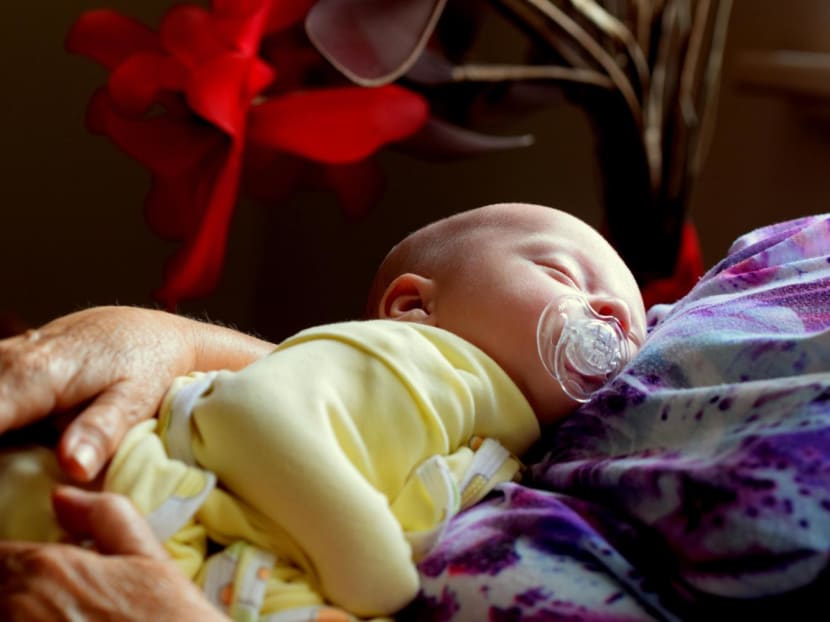Should those who look after grandchildren be paid by Govt? Parents supportive, but experts warn of potential impact
SINGAPORE — When Ms Fadzillah Nur, 35, had her baby five months ago, she roped in her mother to help take care of the child.

- Parents and academic experts believe that grandparents should be recognised for their role in caring for their grandchildren, which in turn contributes to the economy
- However, the academics were split on whether this means the Government should give handouts to the elderly folks
- The Economist ran an article in January arguing that grandparents deserve to receive government funds because of their contributions to the economy.
- This is because their role in providing childcare helps free up parents, especially mothers, to return to the workforce.
- Working mothers who rely on their parents to look after their children can claim S$3,000 under the Grandparent Caregiver Relief, but there are no direct payouts to grandparents
SINGAPORE — When Ms Fadzillah Nur, 35, had her baby five months ago, she roped in her mother to help take care of the child.
Regardless if the senior executive worked from home or in the office, Ms Fadzillah’s mother would come over to her house and help to feed the baby, among other things.
For her mother’s efforts, Ms Fadzillah gives her money every month. She also covers expenses for the baby, so that her mother would not have to spend money on things like milk powder and diapers.
“But for my mother and in-laws, they have mentioned that they don't expect anything in return. They're happy to be involved,” Ms Fadzillah said.
She believes that grandparents who help to look after their grandkids should be compensated as they are providing a service.
“It's like grandparents are an alternative to infantcare and childcare — so that's a service right? Even if the grandparents think of it as a favour,” she said.
But Ms Fadzillah recognises that not everyone may be able to afford this.
In such cases, she believes that a government financial assistance scheme for child-caring grandparents is a good idea.
Ms Cynthia Tee, 35, a full-time working mother of three, said that the help rendered by her mother for her 14-month-old son was immense. “Without her, it would be very hard for me to rejoin the workforce,” she said.
“It’s wonderful to have reliable help from our parents so we can focus on our work and even give us the freedom to have time to ourselves, even if it just to run errands for the family.”
She and her husband contribute 10 to 20 per cent of their combined income to her parents.
A GRANDPARENT’S ROLE IN SOCIETY
While most would agree that grandparents play an important role in society, especially as caregivers to their grandkids, experts and families are divided on whether they should receive government support for their efforts.
In January, The Economist ran an article arguing that grandparents deserve to receive government funds because of their contributions to the economy.
Their role in providing childcare helps free up parents, especially mothers, to return to the workforce.
Though there have been few, if any, studies done on the economic value that grandparents bring to society, experts agree they are major contributors.
Associate Professor Kang Soon-Hock of the Singapore University of Social Sciences (SUSS) said that beyond providing childcare, grandparents also serve as role models for their grandchildren.
“We should not forget their roles as parents to their adult children to whom they may also provide counsel and advice,” said Assoc Prof Kang, who is the vice-dean and head of the Behavioural Science Core at SUSS.
And on a larger societal level, grandparents also provide their adult children with the peace of mind to go to work, knowing that their children are in good hands, he added.
On how their economic contributions can be quantified, Associate Professor of Economics Huang Fali from the Singapore Management University suggested looking at the proportion of children being taken care of by grandparents and evaluating the amount of childcare expenditure.
The amount of money parents would have to spend on childcare expenses after school hours if not for the help of grandparents is another way to quantify their contributions, she said.
Working mothers who rely on their parents to look after their children can claim S$3,000 under the Grandparent Caregiver Relief.
However, grandparents have no similar official recognition or compensation from the Government.
As to whether they should receive government support for their efforts, Assoc Prof Kang of SUSS said that this depends on whether elderly parents provide support to adult children without any return.
“It may not necessarily be the case. It is possible that some elderly parents may be providing such support in exchange for living with their adult children,” he said.
Assoc Prof Kang added that the payment of childcare in this case may lead to “changes in existing intergenerational arrangements” that the elderly parents are already benefiting from.
For instance, if there is an official government payment for childcare provided by grandparents, it may replace the existing financial support arrangement that adult children may have with their elderly parents.
This is fine if the payment is larger than the existing arrangement. However, if it is lower and replaces the existing financial arrangement, the grandparents will receive less, he said.
Similarly, Assoc Prof Huang has her reservations about government payouts as it may affect how people view grandparents who care for their grandchildren.
“People may say ‘oh it’s because the Government gives you money that’s why you care about them’,” she said.
Instead, she said benefits could be provided in a more “subtle” way such as encouraging grandparents to help care for their grandchildren and providing recognition to those who do.
HOW ABOUT A MATCHING GRANT?
For homemaker Rohayah Othman and her husband Haniff Ahmad, a retiree, financial compensation does not really come to mind when it comes to taking care of their granddaughter — whom they look after for a few hours every weekday after the end of preschool while the child’s parents are at work.
Mdm Rohayah declined to reveal if she receives any extra amount from her daughter and son-in-law for the caregiving support rendered, saying that “whatever they give us is more than enough already”.
“We don’t expect them to give us extra because we know the cost of living nowadays is so high. After all, she’s our grandchild,” said Mdm Rohayah.
She added that all of the child’s expenses are paid for by her parents, while she and her husband spend only on little gifts for their grandchild like any other grandparents would.
Mdm Rohayah believes it is okay for grandparents to spend a little on their grandchildren, as long as they can afford it.
“But in cases where grandparents still need money to cover their own living expenditure, it’s good for the adult children to pay for whatever the grandparents spend on the grandchild,” she said.
Mr Haniff suggested that the Government could consider introducing a matching grant as a way to encourage adult parents to give financial recognition to grandparents for their caregiving efforts.
“For every S$2 the adult children give to the parents, the Government can perhaps add S$2, or S$1,” he said.
Dr Kelvin Tan, the head of Minor in Applied Ageing Studies programme at SUSS, supported a government allowance for grandparents.
He also suggested providing vouchers for things like groceries.
“This gives confidence to the grandparents and assurance that their role is being recognised,” he said.
He also believes parents should provide an allowance to their elderly parents for helping with the children as a “nice gesture for the family”.
It will also help to relieve some of the financial burden as grandparents may have to pay for additional things such as food or transport while caring for the children.
To help parents in this aspect, Dr Tan said that the Government could top up the Grandparent Caregiver Relief.
However, Ms Ho Li Ling, 34, a lawyer and mother of a two-year-old, noted that while working mothers can tap the Grandparent Caregiver Relief, it is up to them on how to distribute this to grandparents.
“There’s an expectation that some of the tax relief money by right should go to the grandparents. But in reality there’s no way to control or enforce how much the mother gives her parents.” WITH ADDITIONAL REPORTING BY TAUFIQ ZALIZAN













